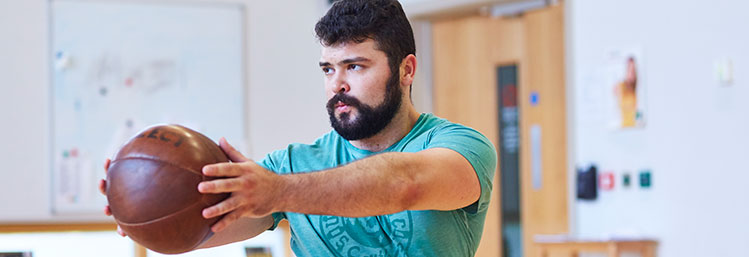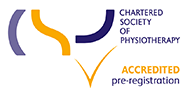
Physiotherapy
BSc (Hons)
- Typical offer for 2025
- Duration
- UCAS code
- Start date
- Location
Suitable for applications.
The chance to go out on placement and work in the clinic here on campus has been really valuable - it's a great way to gain hands-on experience. I've worked in different areas gaining experience in a lot of the core areas, including musculoskeletal, neuro, cardiovascular and respiratory. For my elective placement I worked with patients at Pinderfields Hospital suffering from acute stroke, because this is an area that I'm particularly interested in.
Teaching, learning and assessment
A major focus of the course is on problem solving and clinical reasoning. Some large group teaching utilises the concept of team-based learning (TBL) whereby some knowledge-based content is studied out of class and is then assessed by answering multiple choice questions individually then as a small group or ‘team’.
Lectures are supplemented with small group tutorials and practical sessions to facilitate an active and collaborative approach to learning. Case-based scenarios are used to facilitate the development of clinical reasoning skills. Reflection is embedded at all levels. These skills are ultimately evidenced in the practice setting.
The programme uses a diverse range of assessment strategies that accommodate different learning styles. These include:
- some continuous assessment of competence-based clinical skills
- practical assessments that are designed to mirror the clinical environment
- assessments that require you to demonstrate academic writing skills
- a common assessment tool for practice placements, used collaboratively with three universities in the region
- group and individual presentation tasks
What our students say
Study support
The Faculty of Health Studies has a dedicated student support office. MyBradford, based in our main Richmond Building, can also provide advice on course fees and maintenance grants/loans from the Student Loans Company.
As a student at the Faculty of Health Studies, you are also able to access the University’s other student support facilities, including the Academic Skills Advice Service, the Counselling Service and the Disability Service.
Research
Terms and conditions of study
The University has a set of terms and conditions for all students accepting an offer to study on a course here at Bradford. This is called The Student Contract. This document sets out the Terms and Conditions which apply when you accept an offer of a place on a programme of study at the University of Bradford.
View our Student Contract for further details.
Transparency statement
Information about this programme and its modules has been published in advance of the academic year to which it applies. Every effort has been made to ensure that the information is accurate at the time of publication, but changes may occur given the interval between publishing and commencement of teaching. Any change which impacts the terms and conditions of an applicant’s offer will be communicated to them.


